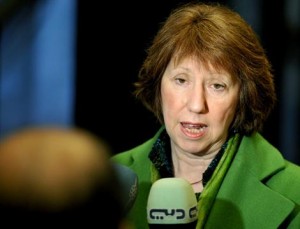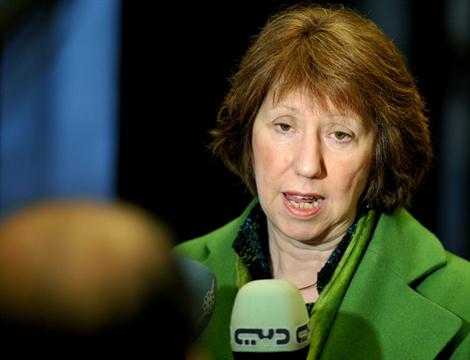
The European Union High Representative for Foreign Affairs and Security Policy Catherine Ashton delivered a speech to the European Parliament and spoke extensively on the current situation in Egypt. According to Thursday’s press release, Ashton said there are still several issues which Egypt must overcome for the country to get on the right track.
“There is clearly a serious political divide in the country between the government and the main opposition – the National Salvation Front,” Ashton said, acknowledging the presence of “demonstrations and violent clashes across the country”.
Speaking on behalf of the EU, Ashton urged calm, restraint and dialogue.
Ashton also said Egypt is facing huge economic challenges, citing the budget deficit and $14bn funding gap. “This is the issue more than any other that is immediate and needs our engagement, notwithstanding the political challenges the country faces,” Ashton said. “More than ever, Europe as a neighbour and a partner has to engage and support Egypt’s democratic transition.”
Ashton said the purpose of the European Union Special Representative Bernardino Leon’s visits to Egypt recently have been to build confidence and find common ground on political and economic issues with the government and “the whole political opposition”.
“Together with the other members of the international community we will continue to push for the finalisation of the IMF (loan), which will allow the EU to mobilise macro-financial assistance worth €500m,” Ashton said, adding that the parliament would have to look at ways in which to best mobilise existing financial assistance.
“We are all aware of the consequences of an economic collapse that would be devastating,” Ashton said. “Europe cannot allow or afford this happening and we have to approach the problem in a constructive and timely manner.”
Ashton also spoke on the democratic transition, saying democracy building is not “a quick fix” and requires hard work, commitment and patience both domestically and internationally. “The fact that we do have ‘an opposition’ in Egypt is in itself a democratic achievement,” Ashton said. “That Egypt had peaceful and fair presidential elections is another and so is Egypt’s formal invitation to the EU to observe the upcoming parliamentary elections.”
Regarding the suspension of the House of Representatives election, Ashton praised President Mohamed Morsi’s acceptance of the postponement. “This will likely postpone the elections giving more time to reach agreement on the outstanding issues,” she said.
“In this very tense political context elections must be held in conformity with the constitution and in a peaceful, inclusive and transparent manner,” Ashton said, warning that voting is “only one component of democracy building”, another being cooperation with all sides “in order to build bridges and promote reconciliation, to respect and safeguard the fundamental human rights of all citizens, whether they are “winners” or “losers”.
Ashton said the EU must show “strategic patience” concerning political developments in Egypt, but that they would not remain silent on issues such as freedom and human rights.
On the subject of human rights, Ashton said EU Special Representative for Human Rights Stavros Lambrinidis conveyed the union’s position to the government. Of particular concern to the EU are issues of police abuse, torture, impunity, deteriorating freedom of expression and belief, women’s rights, working conditions for non-governmental organisations and the promotion of economic and social rights.
“We have stressed the importance of ensuring a favourable environment for civil society and encouraged the adoption of a new NGO law that ensures NGO transparency while respecting the independence of civil society from government control, that eliminates burdensome registration procedures, that does not subject NGO activities to prior government approval on the basis of their alleged ‘usefulness to society’, and that does not limit or demonise NGO funding,” Ashton said.
“The situation of women in Egypt is of great concern, in particular violence and other forms of harassment,” Ashton said. “We are funding a €4m project- with UN women- on women empowerment.”
Ashton also said the EU supports the National Council for Women and their drafting of a national strategy for combating violence against women.
Wrapping up her speech, Ashton said the EU must support Egypt’s efforts as a regional power, including “its involvement in the League of Arab States, its attempts to bring together regional powers in the search of a political solution to the Syria crisis, the brokering of the Gaza ceasefire, and its continued effort on Palestinian reconciliation.”


